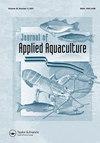Evaluating the feasibility of feeding RAS-produced Atlantic salmon ( Salmo salar ) during the depuration process: effects on fish weight loss and off-flavor remediation
IF 0.8
Q3 FISHERIES
引用次数: 0
Abstract
Depuration is a proven pre-harvest procedure that eliminates off-flavor from Atlantic salmon produced in recirculating aquaculture systems. However, applied research indicates that depurating salmon lose weight while fasting, which reduces farmgate revenue. Low-ration feeding was therefore evaluated as a method to mitigate weight loss while depurating 3–4 kg Atlantic salmon. Salmon implanted with passive-integrated-transponders were weighed, exposed to concentrated geosmin (GSM) and 2-methylisoborneol (MIB), and stocked in eight pre-disinfected partial reuse systems. Feed was either offered for 4 days or withheld entirely (n = 4) during a 6-day depuration period. Salmon from both treatments rapidly eliminated GSM and MIB, but slightly lower levels remained in fish that were fed (P < .05). Fed and fasted salmon lost 0.3 and 1.1% of their initial body weight, respectively (P < .05). Under the conditions of this study, feeding Atlantic salmon during depuration minimized weight loss without negatively impacting off-flavor elimination.评估在净化过程中饲喂ras生产的大西洋鲑鱼(Salmo salar)的可行性:对鱼类体重减轻和异味修复的影响
净化是一种经过验证的收获前程序,可消除循环水产养殖系统中生产的大西洋鲑鱼的异味。然而,应用研究表明,净化鲑鱼会在禁食时减肥,从而减少农场收入。因此,低日粮喂养被评价为在净化3-4公斤大西洋鲑鱼的同时减轻体重损失的方法。植入被动集成应答器的鲑鱼称重,暴露于浓缩土臭素(GSM)和2-甲基异冰片醇(MIB)中,并储存在八个预消毒的部分重复使用系统中。在6天的净化期,饲喂4天或完全不饲喂(n = 4)。两种处理的鲑鱼都迅速消除了GSM和MIB,但喂食鱼的水平略低(P < 0.05)。喂食鲑鱼和禁食鲑鱼的初始体重分别下降0.3%和1.1% (P < 0.05)。在本研究的条件下,在净化期间喂养大西洋鲑鱼可以最大限度地减少体重,而不会对去除异味产生负面影响。
本文章由计算机程序翻译,如有差异,请以英文原文为准。
求助全文
约1分钟内获得全文
求助全文
来源期刊

Journal of Applied Aquaculture
Environmental Science-Ecology
CiteScore
3.20
自引率
0.00%
发文量
38
期刊介绍:
The Journal of Applied Aquaculture is a platform for the sharing of practical information needed by researchers to meet the needs of investors, farm managers, extension agents and policy makers working to adapt aquaculture theory to achieve economic and food security objectives in the real world. The journal emphasizes multi-disciplinary research and case studies that propose financially and logistically viable solutions to observable problems.
 求助内容:
求助内容: 应助结果提醒方式:
应助结果提醒方式:


